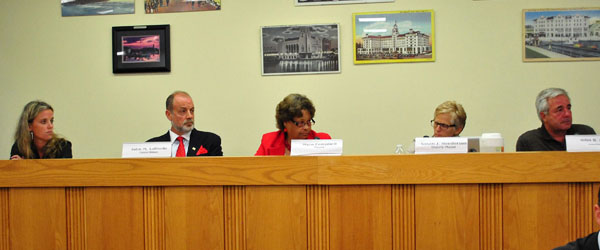Thompson to council: Support use of anti-overdose drug
If successful, first responders would carry overdose antidote
In recognition of the recent rise in heroin abuse in Monmouth County, a city resident is leading an effort to put an overdoes antidote in the hands of first responders in Asbury Park.
Randy Thompson [shown at right] sought the help of city policymakers at council meetings in January and February, explaining the benefits of the New Jersey Overdose Prevention Act and urging the council to support putting Naloxone, an anti-overdose remedy, in the hands of police and first responders.
The act, signed into law by Governor Christopher Christie in May of 2013, seeks to reduce the number of overdoses in New Jersey through a two-pronged approach. It provides immunity from civil and criminal prosecution to those who witness heroin overdoses thereby encouraging them to report when overdoses happen and gives greater access of Naloxone to non-medical personnel without fear of legal repercussion, according to Rosetta Scotti, the New Jersey State Director for drug law reform and advocacy group Drug Policy Alliance.
“I have lost friends and family to substance use, it is an issue that is affecting every community certainly Asbury Park,” Thompson told the Sun. “I work in the mental health and substance use advocacy field and I am also a person in long term recovery from substance use, so the issue hits home with me.”
According to the law, doctors can also prescribe naloxone to family members, peers, partners — anyone who has an opiate abuser in their life. In fact, if it were not for the Federal Drug Administrations strict guidelines and lengthy process to OK drugs for over-the-counter sales, naloxone would probably be available to the general public, she said.
The process to get it in the hands of emergency personnel in Asbury Park is as simple as having the medical directors who oversee the EMT’s provide it, Scotti said.
A 2012 study published by the New Jersey department of Human Services Division of Mental Health and Addiction Services shows Asbury Park [147] residents came in fifth highest in terms of the number of substance abusers admitted to treatment centers for heroin abuse. The top four before it were Middletown [255], Howell [195], Keansburg [187] and Marlboro [177].
“We know, and have always known, that drug use takes place in cycles,” Scotti said. “We seem to be in a cycle where opiates are on the upswing for social and economic reasons.”
So far, there has been interest from council members John Moor and Amy Quinn in learning more about the program, as well as from city management, Thompson said.
“We are looking into it … we have to make sure the city is on safe ground before we move forward,” said Mayor Myra Campbell at last week’s council meeting.
“Some concerns were brought up, but it is important to note that other municipalities have already elected to enact naloxone programs as they have placed the priority on saving lives over lingering ‘what-ifs’,” said Thompson.
The Ocean County Prosecutor’s Office has supplied all Ocean County police with doses of naloxone, according to Scotti. Toms River [512] ranks eighth in the state in terms of incidents of heroin abuse and first in Ocean County.
Naloxone can be injected right into the muscle or used as a nasal spray, Scotti said. The drug attaches to the neural receptors in the brain to counteract the overdose, she said.
The cost ranges between $.60 to $1.00 for injectable doses and around $20.00 per dose for nasal spray, Thompson said.
Should city policymakers decide they want to move forward, Thompson said the South Jersey Aids Alliance is willing to provide naloxone training to police and first responders and he would be interested in organizing a fund raiser to collect the money to purchase the doses.
“I want the city to really promote this,” he said. “It would be great for them to use the nonprofit community to get the word out there.”
————————————————————
Follow the Asbury Park Sun on Facebook and Twitter.













